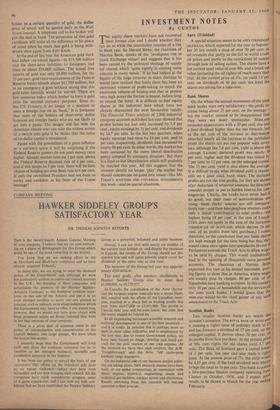INVESTMENT NOTES
By CUSTOS
THE equity share markets have not recovered their former elan and I doubt whether they can do so while the uncertainty remains of a rise in Bank rate. Sir Harold Bibby, the chairman of Martins Bank, speaks of the 'prodigious rise in Stock Exchange values' and suggests that it has been caused by the technical shortage of supply (of shares) which 'quite rightly is causing some concern in many minds.' If he had looked at the figures of the huge turnover in share dealings he would have realised that lately there has been an enormous volume of profit-taking to match the enormous volume of buying and that at present very high prices the former is bound, before long. to exceed the latter. It is difficult to find equity shares in the industrial field which have not already discounted the next favourable results. The Financial Times analysis of 2,800 industrial company accounts published last year showed that profits before tax had only increased by 1.8 per cent., equity earnings by 3+ per cent. and dividends by 13.7 per cent. In the last two quarters, when equity earnings had risen by 14 per cent. and 16 per cent. respectively, dividends had increased by nearly 30 per cent. In other words, the market has been sustained by the more liberal distribution policy adopted by company directors. But there is a limit to this liberalisation which will probably be reached this year. All this suggests that the investor should no longer 'play' the market but should concentrate on good new issues—like Mr. Fraser's SCOTTISH AND UNIVERSAL INVESTMENTS this week—and on special situations.
Apex (Trinidad)
A special situation seems to be APEX (TRINIDAD) OILFIELDS, which reported for the year to Septem- ber 30 last month a drop of over 50 per cent, in oil revenues due partly to the fall in world crude oil prices and partly to the restrictions of output through lack of selling outlets. The shares have a net current asset value of over 80s. and a break-uP value (including the oil rights) of much more than that. At the current price of 55s. (to yield 5.9 per cent. on dividends of 40 per cent. tax free) the shares are asking for a take-over.
Bank Shares
On the whole the annual statements of the joint stock banks were very satisfactory—the profit in- crease being about 25 per cent. on the average— but the market seemed to be disappointed that they were not more spectacular. MIDLAND exceeded expectations with a 30 per cent. rise and a final dividend higher than the one forecast, but as the net cost of the increase in distribution absorbed nearly all the increase in the published profit the shares are not too popular with inves- tors, although the 3.8 per cent. yield is above the average. LLOYDS' declared profit was nearly 30 per cent. higher and the dividend was raised by 2 per cent. to 12 per cent. on the enlarged capital. The 3+ per cent. yield is also above the average. It is difficult to say what dividend yield is reason- able on a joint stock bank share. The declared profits are not the true profits, for they are shown after deduction of whatever amounts the directors consider proper to put to hidden reserve for con' tingencies. Clearly, the banks have never had it so good, but their costs of administration are rising—bank clerks' salaries 'are still compara- tively low—and their hire-purchase interests make only a minor contribution to total profits—the highest being 18 per cent. in the case of Lloyds. (This does not apply in the case of the NATIONAL COMMERCIAL OF SCOTLAND, which derives 26 Per cent. of its profits from hire purchase.) I come, therefore, to the conclusion that our bank shares are high enough for the time being but that they would come once again into speculative favour if Parliament amends the Truck Acts to allow wages to be paid by cheque. This would undoubtedly lead to the opening of thousands more personal accounts. The chairman of Martins Bank expressed this view in his annual statement. Oat' ing figures to show that in America, where wages are usually paid by cheque. 80 per cent. of all households have banking accounts. In this country only 30 per cent. of households use the services 01 the joint stock banks. I would guess that the MIDLAND would be the chief gainer of any such amendment to the Truck Acts.
Scottish Banks
Two smaller Scottish banks are worth the investor's attention. The ROYAL BANK OF SCOTLAND is making a rights issue of ordinary stock at E3 and has forecast a dividend of 17 per cent. on the enlarged capital. It derives about 70 per cent. of its profits from hire purchase. At the present price of 98s. cum rights the old shares yield 3.7 Per cent. The Bank of Scotland gave a capital bonus of 2 per cent. last year and also made a righls, issue. At the present price of 77s. the yield would be 4.15 per cent. if the final dividend next Marcia: brings the total to 16 per cent. This bank acquired !, a hire-purchase finance company operating frorn Chester in October, 1958, and I expect gool results to be shown in March for the year ending February.


































 Previous page
Previous page